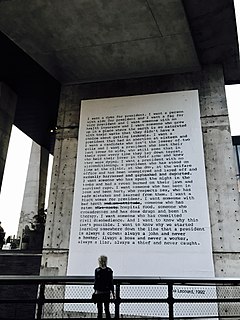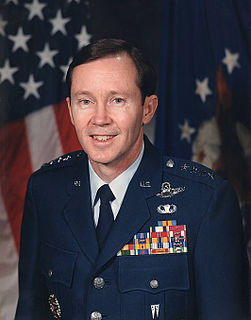A Quote by Shimon Peres
The foes now are universal - poverty, famine, religious radicalization, desertification, drugs, proliferation of nuclear weapons, ecological devastation. They threaten all nations, just as science and information are the potential friends of all nations. Classical diplomacy and strategy were aimed at identifying enemies and confronting them. Now they have to identify dangers, global or local, and tackle them before they become disasters.
Quote Topics
All Nations
Become
Before
Classical
Confronting
Dangers
Devastation
Diplomacy
Disasters
Ecological
Enemies
Famine
Foes
Friends
Global
Identify
Identifying
Information
Just
Local
Nations
Now
Nuclear
Nuclear Weapons
Potential
Poverty
Proliferation
Religious
Science
Strategy
Tackle
Them
Threaten
Universal
Weapons
Were
Related Quotes
After the First World War, it was, like, let's form the League of Nations, we have to learn to work together. It's the only way we're going to survive. And now it's like we're undoing these very fragile institutions that were built after the First and Second World Wars that were about nations working on a kind of global diplomacy for our mutual benefit. And we're undoing them at such rapid-fire pace.
The worst part of what we heard Donald [trump] say has been about nuclear weapons. He has said repeatedly that he didn't care if other nations got nuclear weapons, Japan, South Korea, even Saudi Arabia. It has been the policy of the United States, Democrats and Republicans, to do everything we could to reduce the proliferation of nuclear weapons.
The invasion of Iraq will surely go down in history as one of the most cowardly wars ever fought. It was a war in which a band of rich nations, armed with enough nuclear weapons to destroy the world several times over, rounded on a poor nation, falsely accused it of having nuclear weapons, used the United Nations to force it to disarm, then invaded it, occupied it, and are now in the process of selling it.
If you want to find weapons of destruction, you can find them all over the place. Take, say, Israel. There is a very great concern right now about proliferation of nuclear weapons, as there should be. Israel has a couple of hundred nuclear weapons and also chemical and biological weapons. This stockpile is not only a threat in itself but encourages others to proliferate in reaction and in self-defense. Is anybody saying anything about this?
Donald Trump believes that the world will be safer if more nations have nuclear weapons. He's said Saudi Arabia should get them, Japan should get them, Korea should get them. And when he was confronted with this and told, wait a minute, terrorists could get those, proliferation could lead to nuclear war, here's what Donald Trump said, and I quote, go ahead, folks, enjoy yourselves.
Donald Trump believes that the world will be safer if more nations have nuclear weapons. And he's said Saudi Arabia should get them, Japan should get them, Korea should get them. And when he was confronted with this, and told, wait a minute, terrorists could get those, proliferation could lead to nuclear war, here's what Donald Trump said, and I quote: "Go ahead, folks, enjoy yourselves."
Hunger, disease and poverty can lead to global instability and leave a vacuum for extremism to fill. So instead of just managing poverty, we must offer nations and people a pathway out of poverty. And as president I've made development a pillar of our foreign policy, alongside diplomacy and defense.
I would consider the principal threats to start with Russia. And it would certainly include any nations that are looking to intimidate nations around their periphery, regional nations nearby them, whether it be with weapons of mass destruction or I would call it unusual, unorthodox means of intimidating them.
The time has come for those nations that rely on the force of nuclear armaments to respectfully heed the voices of peace-loving people, not least the atomic bomb survivors, to strive in good faith for nuclear disarmament and non-proliferation, and to advance towards the complete abolishment of all such weapons.
I would consider the principal threats to start with Russia, and it would certainly include any nations that are looking to intimidate nations around their periphery, regional nations nearby them, whether it be with weapons of mass destruction or, I would call it, unusual, unorthodox means of intimidating them, that sort of thing.
There's no question that Saddam Hussein is a threat Yes, he has chemical and biological weapons. He's had those for a long time. But the United States right now is on a very much different defensive posture than we were before September 11th of 2001 He is, as far as we know, actively pursuing nuclear capabilities, though he doesn't have nuclear warheads yet. If he were to acquire nuclear weapons, I think our friends in the region would face greatly increased risks as would we.







































